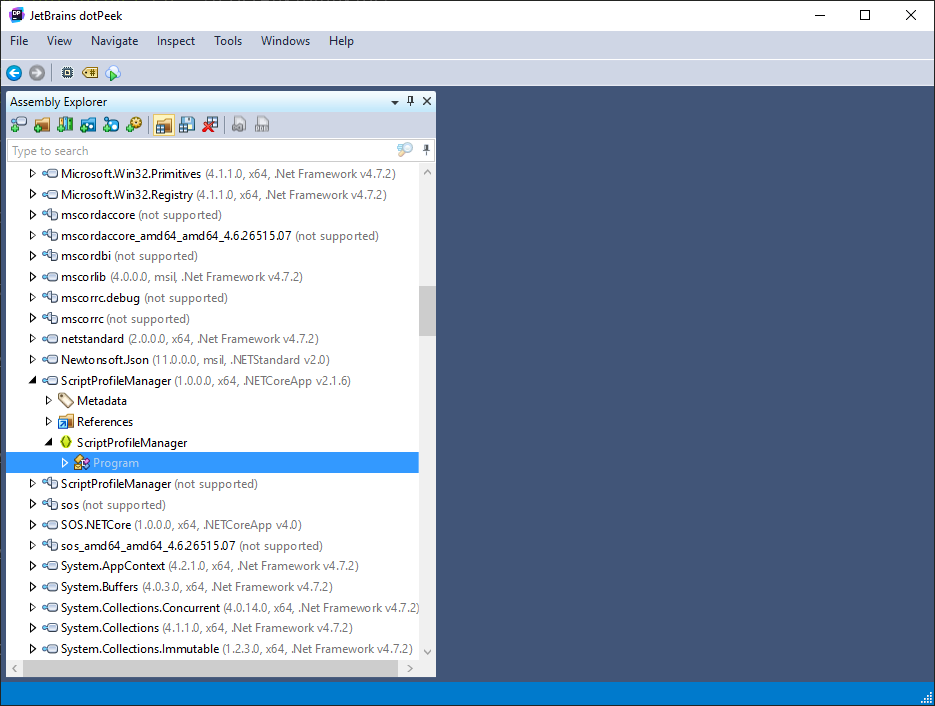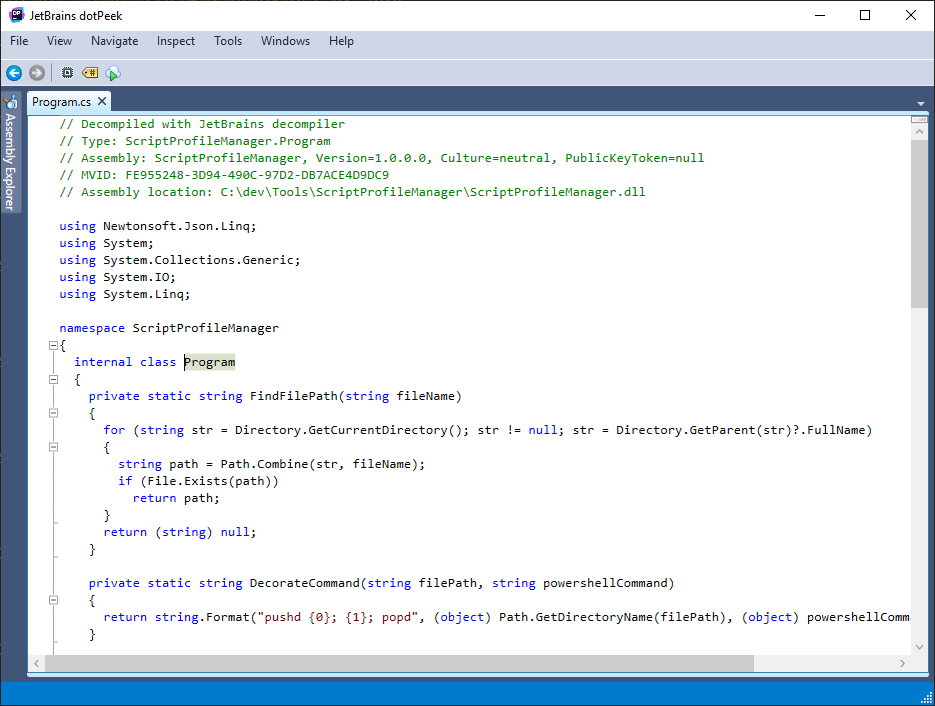Decompiling .NET Apps
2019-02-08
Project Page
About a year ago I was forwarded a link to
.ok introducing the concept of .ok directory
profiles. The basic idea is to define a new .ok file format containing
frequently used scripts which can be added to projects for easy access so you
don't have to remember the exact syntax for a given task. After reading the
description of SecretGeek's version I decided to build it myself with a couple
of modifications.
The original description of the tool describes a simple file with a script per line and a utility which will either output the file with numbers before each line to the console if no parameters were passed to it, or run the script associate associated with the passed in number. SecretGeek also provides implementations of this specification as bash and powershell scripts.
My Changes
My version was similar but contained two main modifications. First, instead of a bare bones file with scripts per line, I decided to do a bit of preprocessing. Each line in my version was made up of a name, a colon separator, and the script associated with that name. Then when querying the file for what scripts can be run, instead of just writing the file with line numbers, my version simply outputs the list of names. A script could then be run by passing the utility a name. Second, my version would walk up the directory tree searching for the .ok file, and run the script in that location. This lets me treat the profile as project wide and frees me up from worrying about where my current working directory is. Lastly I wrote the bulk of the code in c# instead of in powershell, allowing me to take advantage of nuget packages and a non-crappy programming environment.
The Task
I built this version in my spare time at work and used it for the better part of 3 months. Around then my I went on a break at which time my machines changed and I lost the source code for my version of the directory profiles. So my task today is split into two parts: Learn how to decompile C# source, and rebuild the tool with backwards compatibility so that I can continue to iterate on the project. To make it even more interesting I think I will write my reimplementation in Rust to improve my comfort and proficiency in that language as well as take advantage of the single binary compilation that Rust provides for free. The original utility was compiled using DotNet Core 2.0 which did allow me to write all of the dependencies to the local directory, but didn't go the extra step of compiling them into the executable. So to use the tool I had to cart around a giant directory full of random DLLs. Rust will fix this issue. Also its cool.
As an added complication, the code is currently split across the .net core app and a simple powershell wrapper script. I don't see a way around having at least a minimal wrapping script in whatever shell language, but there is currently an assumption in the c# code that the shell is Windows-ish since it wraps the output command in pushd and popd calls. I hope to introduce some command line arguments in this version of the tool to make that portion paramaterized.
Lastly, the original version of the tool included the feature of parsing project.json files to find the scripts in those files and add them to the list. I think this is an added complexity I don't need right now, and I only used it once anyway, so for now I am ommiting it for simplicity.
dotPeek
I'll be using the free and wonderful dotPeek from JetBrains to decompile my binary and recover a version of the source code used to create the tool. Decompiling was as simple as pointing dotPeek at the folder containing my compiled tool, expanding the entry with the name of my tool, and double clicking on Program.cs.

After a brief moment, this code popped up in an eerily visual studios like editor:

The decompiled source in its entirety can be found here. I would say the decompiler does an... alright job. It does some strange things to variable names given that it can't recover them from the binary, and all formatting is lost. It does however preserve method names which is a blessing, so we will take what we can get. With that out of the way we can move on to building a bigger and better version. An oxidized version if you will.
At this point, its 1:30 am in the morning, so I'll have to leave the rest of the porting for next time. I suspect I will get better as I go along. I've finished much of the Rust code stumbling behind the scenes, so tomorrow I should be able to finish it up and do a quick write up describing the difficulties I ran into along the way.
Till tomorrow,
Kaylee